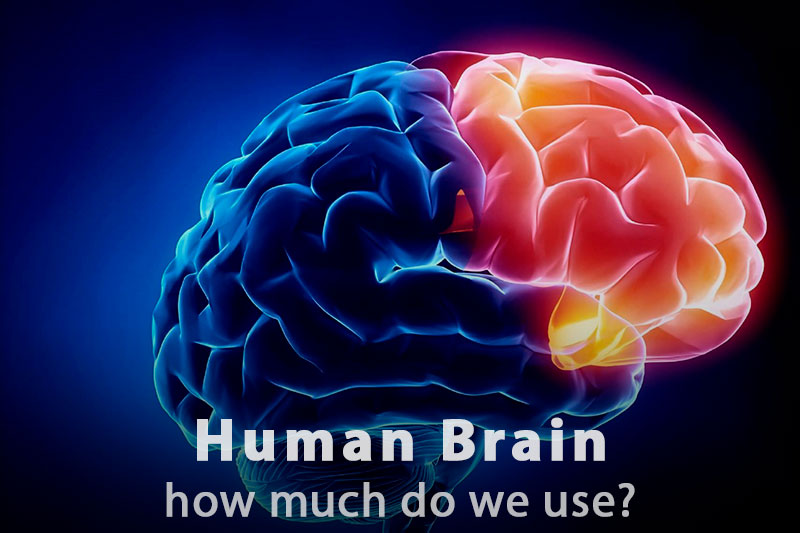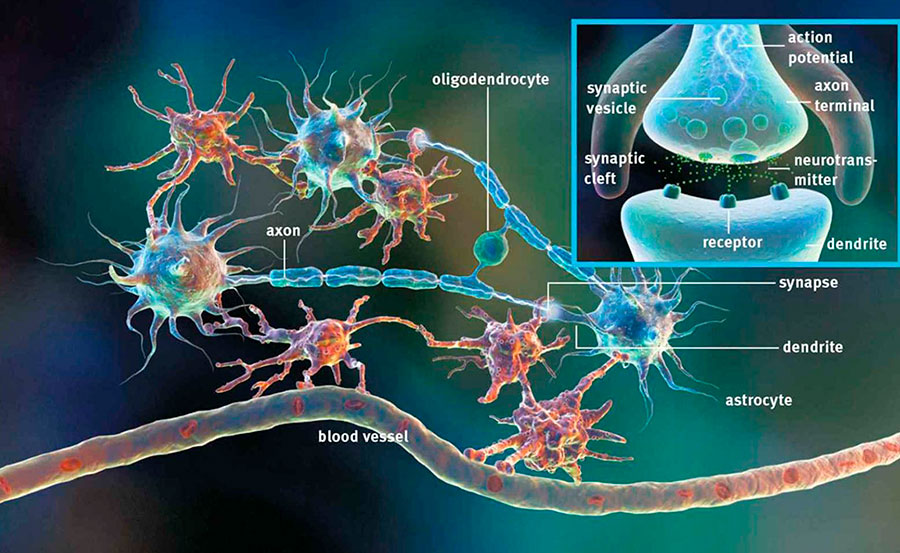Most people know that human does not use all of their brainpower. Some say that we use only 50%, 25%, 10%, or even 5%. Most of the time we hear an estimate of 10%. Clearly, the study of the brain and its capabilities are receiving a lot of attention from neuroscientists around the world. So, what do the experts think about this issue? After a detailed study of the current data, let's figure out the popular myth about 10%.

The human brain is used at 100%. It just consists of various sections, some of which do not work for their full potential without need.
In general, this statement is often credited to Albert Einstein. In fact, it was first mentioned by the writer Lowell Thomas, who wrote the preface to Dale Carnegie's "How to Win Friends and Influence People". It is still uncertain what he had relied on.
You can train your thinking, memory, reaction speed, and other characteristics with special exercises. But it makes the active parts of the brain more productive, rather than engages the inactive parts.
It turns out that all parts of the brain can simultaneously work at maximum capacity. But it doesn't happen at the moment of genius enlightenment; it happens during an epileptic seizure. Not exactly genius, don't you think?
Today, all of the world's leading neurobiologists agree that the human brain functions at 100%. This is confirmed both by numerous tests and by common sense. A study of different parts of the brain during different activities (physical and intellectual) has determined precisely that they are working at full capacity.
In addition, if some part of the brain was not used, the human body would clearly give it up in the process of evolution. Thus, such individuals would gain a significant advantage and would dominate, leaving more numerous offspring. The rest, carrying useless weight in the cranium, would inevitably have been displaced. It is also worth noting that the brain, which is only 2% of body weight, consumes 50% of the glucose produced by the liver. Hardly all of this energy is wasted.
The myth that the brain works at 10% was plausible at the end of the 19th century (when it was actually originated). At that time, even leading scientists had no idea what one or another part of the brain was responsible for. Today, however, the function of each fragment has been carefully studied. A long ago, scientists have established which part of the brain is used for.
For example, the parietal lobe is responsible for logic and counting, reading and writing. The functions of the temporal lobe are memory and auditory analyzer. And the cerebellum is needed to keep balance and coordinate movements. Of course, with different activities, the activity of different parts of the brain changes. For example, if a person is sitting in a comfortable chair and reading a book, the parietal lobe is involved to the maximum, while the cerebellum is relaxed and almost inactive. And vice versa, the cerebellum works at its maximum capacity when performing physical activities, but the temporal and parietal lobes are not too active. This allows you to concentrate on a certain task and send all available resources exactly where they are most needed.
But the question of how the human brain works, if different parts of it create a single human consciousness while performing their functions, is still unanswered. We can only hope that this mystery will be solved in the future.
The body is a complicated tool, and each part of the body can be made more powerful. Yet if one can build muscles, why can't they build brains? It turns out that it is possible. And the best time to do it is in childhood, up to the age of 7. It can be made at the later stages, but the instrument's main " tuning " occurs exactly in childhood, and then only fine "calibration" takes place.
There are a lot of exercises for this purpose. Athletics, gymnastics, and dancing allow you to develop the cerebellum. If it is necessary to develop the intellect, there are also quite a few exercises. The best of them is reading. Moreover, a person can read themselves or be read to. In any case, the brain is actively developing, strengthening the connections between the neurons takes place. As a result, memory improves, imagination develops, and the speed of thinking increases. Another good example is math. Solving mathematical examples of varying complexity allows you always to keep the brain in tone. It has long been proven that when people do math or read a lot, Alzheimer's disease occurs much later in comparison to their peers or does not occur at all. 
In other words, it is those operating functions that develop. Keeping this in mind, you can develop the brain in the right direction just by doing the right amount of exercise.
Many people want to know how to make their brains work at 100%. As we have said, different brain parts are used for different purposes. But what will happen if all the parts of the brain reach their maximum capacity at once? Generally speaking, this is against human nature. Hardly anyone needs to run at maximum speed along the narrow path where one has to keep their balance while solving a complicated mathematical problem, remembering a forgotten poem, or trying to paint a picture.
Still, sometimes it happens that the brain can be fully activated when every area is active at the limit of possibility. Although it happens during epileptic seizures, it can hardly be called genius or superpower.
References: Links and sources